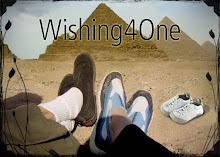The article below is an awesome description of the time now here in Cairo....you really feel the holiday spirit everywhere. The little white "kahk" cookies, most peole buy them now, very, very few, maybe older generations, make them at home these days. Of course, I bought them from bakery...LOL...But my husbands sisters did make some at home. I helped them last year making them at home, it was fun, but so much work, as they make 100's but seemed like 1,000's of em!! I have a picture but still can't upload, will try again later!
Egypt's Muslims prepare for Eid al-Fitr feast
Cairo - Ahmed Abdel-Azim usually breaks his fast, in the last days of the holy month of Ramadan, in his house. A little later however you would find him roaming the streets of Cairo, children in toe, as the wife sits at home baking.
For an outsider, it might seem like a mystery that people - both buyers and sellers - in Egypt take extensively to the streets at the end of the holy month.
The streets of Cairo are usually beyond busy and it seems like a shopping season has begun.
It is no mystery if you are an Egyptian. It is simple: This is a 'wild time' as some say. It is the time of 'Eid'.
Shopping for clothes and accessories, shopping for sweets, and shopping for decorations for the Eid al-Fitr or Lesser Bairum festival which marks the end of Ramadan seem to be all Muslims do during the end days of Ramadan in Cairo.
'The clothes-hunt begins in the last days of Ramadan, where everybody else in this country seem to be also shopping,' says a smiling Ahmed, referring to a ritual, outlined by Islamic tradition, of wearing at least one piece of new clothing to celebrate the end of Ramadan and the three-day Eid feast that follows.
'It's hectic, but the children enjoy it. They love buying new clothes,' says the middle-aged father of three. 'So naturally, I'm happy that my children are happy.'
Like many other Egyptian Muslims, Ahmed takes on the routine in expectance of the Eid, where Muslims celebrate the conclusion of 30 days of piety, fasting and praying.
The men, and sometimes the women, have the sole duty of buying the new clothes for the family and especially the children. Shops stay open late, and Muslims usually arrive after the iftar fast-breaking meal to buy the best and the most colourful of clothes - those, at least, that they can afford.
It is generally a spending period.
Besides clothes, Muslims are also obliged to spend on alms - Zakat - to the poor during these days. Charity organizations use the donations they receive to buy new clothes and food for the orphaned and homeless so that they, too, may enjoy the Eid festivities.
As the Eid approaches, yet more family visits are expected as Muslims wrap up their spiritual and religious duties in Ramadan.
Between praying and reading the Koran, women cook meals, prepare dessert and bake the famous fattening Eid cookies (Kahk) which are served with sugar, dates, nuts and honey.
Some women make the baking and cooking a social event. They gather in a house and bake as they talk and engage in friendly gossip, exchanging tips on how to make the cookies crunchier, or softer, depending on taste.
They also decorate the cookies in different ways, and give them different shapes apart from the standard round-shape that the Egyptian Kahk is famous for. Some shape the Kahk like a crescent, with white crushed sugar on top, to resemble the symbol of Ramadan and Islam.
Often, the women will use a nearby baker's oven to heat their goodies, baking up to 30 tray loads of mouth-watering cookies, sweet biscuits and other oriental delicacies at once.
Other women - especially working women - choose to buy the famous dessert ready-made from local patisseries, where boxes of cookies are displayed on top of each other.
Bargaining takes place as the prices of tasty Kahks increase every year. In some affluent parts of town, a kilogramme of cookies are sold for up to 50 Egyptian pounds, while the same amount of homemade cookies would cost around five pounds.
Meanwhile, children and teens, who also receive monetary presents from their family, celebrate the coming of Eid with fireworks. Boys and girls meet after iftar and compete on who can fire the loudest and flashiest cracker. Despite the hazards and public media campaigns against it, the traditions is encouraged by some Egyptian parents.
As the Eid nears, people exchange calls and phone messages, and family visits are a must.
The Eid itself begins by a congregational ceremonial prayer that takes place right after dawn. People gather in this prayer to thank God for Ramadan - deemed a month of blessings and mercy - and ask that their good deeds be accepted.
As men, women and children walk or drive to the mosques, they usually chant prayers in unison - like pilgrims in Mecca often do.
After the prayer, the first breakfast, now during the day, is another family event often also including neighbours and relatives. People gather around the table and enjoy a morning meal - for a change, one that is light and small.
SOURCE http://news.monstersandcritics.com/middleeast/article_1213351.php/
Egypts_Muslims_prepare_for_Eid_al-Fitr_feast
Sunday, October 22, 2006
A real good description of Cairo now
Subscribe to:
Post Comments (Atom)

 Cairo Time
Cairo Time






















Great journal, I absolutely agree as I've also been there once,keep up the good work, looking forward to read more of your work!
ReplyDelete